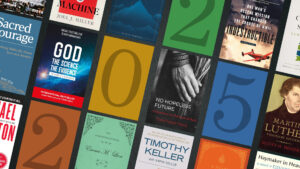She left off “Were you born in a barn?” and “You need some hobbies.” And another favorite, almost always asked in the grocery store: “Are they all yours?”
My kids are all teenagers now, so I remember these comments with a smile. They don’t offend me—I understand that most people don’t have a file folder for people with “larger families,” although a family of six is not extraordinarily large. It doesn’t bother me to be mentally filed under “Hillbilly,” “Catholic,” or even “Mormon”—people are just doing their best to process reality. I remember flying to Cincinnati one Christmas with two lap children and two in car seats. A sweet young Mormon couple on the next row carried on a knowing conversation with us for most of the flight before realizing we were actually just Southern Baptists with no sense of moderation. We deplaned leaving them as baffled by our family planning as many of our Baptist friends were.
Over the years I’ve developed some responses to these repeated awkward questions. For example:
“Don’t you know what causes that?” “Clearly. We’re so good at it we should patent the process.”
“Are they all yours?” “No, I just think Wal-Mart is so fun that I go pick up extra toddlers to bring along with me.”
“Is your husband getting snipped?” “Already has. It was a non-event, really—nothing a bag of frozen vegetables couldn’t mend. Can I serve you some more peas?”
The trickiest one to answer, in my case, is, “Did you mean to do that?” If I say, “Yes, who doesn’t want four kids in four years?” I’m basically insane. If I say, “No,” I’m an idiot. The truth is, I’m not sure what my answer is. The question itself implies far more control over conception than even I can claim to have.
And that’s the real reason we should be careful about these kinds of questions. Yes, they’re funny, and yes, I’m a big fan of self-deprecating humor. But it’s not me these questions can hurt. It’s my friends and family who know with great clarity that conception is a miracle because it is one they have not experienced. It’s the people I love who ache for fertility to be their scandal.
During the Four Years of Much Pregnancy, my dearest friend was infertile. She came to my baby showers and listened to the jokes. She came to my hospital bed four years in a row to hold the latest Wilkin. She cried tears of joy, but I know she carried her sorrow with every casserole she brought to my home. I would have.
So I suggest we stop saying these things to the woman whose arms are full of children for the sake of the woman whose arms are not. Because the answer to “Don’t you know what causes that?” is not a what, but a Who. I don’t know why God gave me children effortlessly and withholds them from others who would make fantastic parents. But I know this: fertility is not a curse, it is a gift. It is a scandalous miracle.
The next time you see a mother with a herd of small progeny, just say, “What a blessing!” And maybe offer to help her get those groceries to the car. Or offer to put her kids through college. Any or all of these responses would be just fine.
Download your free Christmas playlist by TGC editor Brett McCracken!
 It’s that time of year, when the world falls in love—with Christmas music! If you’re ready to immerse yourself in the sounds of the season, we’ve got a brand-new playlist for you. The Gospel Coalition’s free 2025 Christmas playlist is full of joyful, festive, and nostalgic songs to help you celebrate the sweetness of this sacred season.
It’s that time of year, when the world falls in love—with Christmas music! If you’re ready to immerse yourself in the sounds of the season, we’ve got a brand-new playlist for you. The Gospel Coalition’s free 2025 Christmas playlist is full of joyful, festive, and nostalgic songs to help you celebrate the sweetness of this sacred season.
The 75 songs on this playlist are all recordings from at least 20 years ago—most of them from further back in the 1950s and 1960s. Each song has been thoughtfully selected by TGC Arts & Culture Editor Brett McCracken to cultivate a fun but meaningful mix of vintage Christmas vibes.
To start listening to this free resource, simply click below to receive your link to the private playlist on Spotify or Apple Music.


































